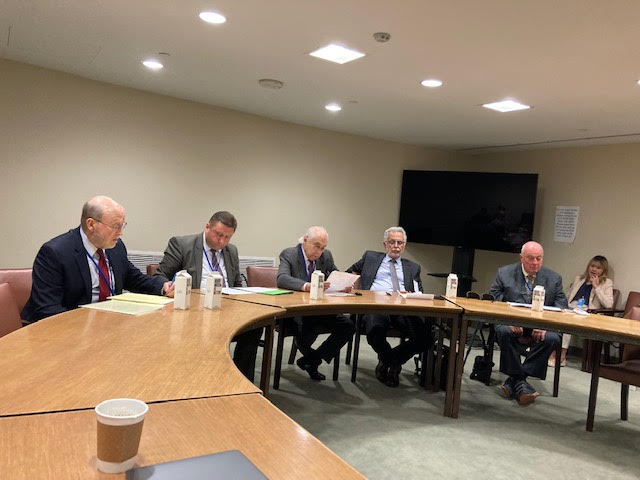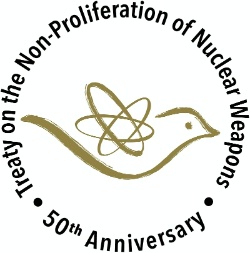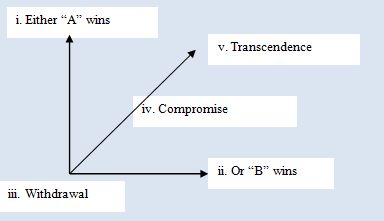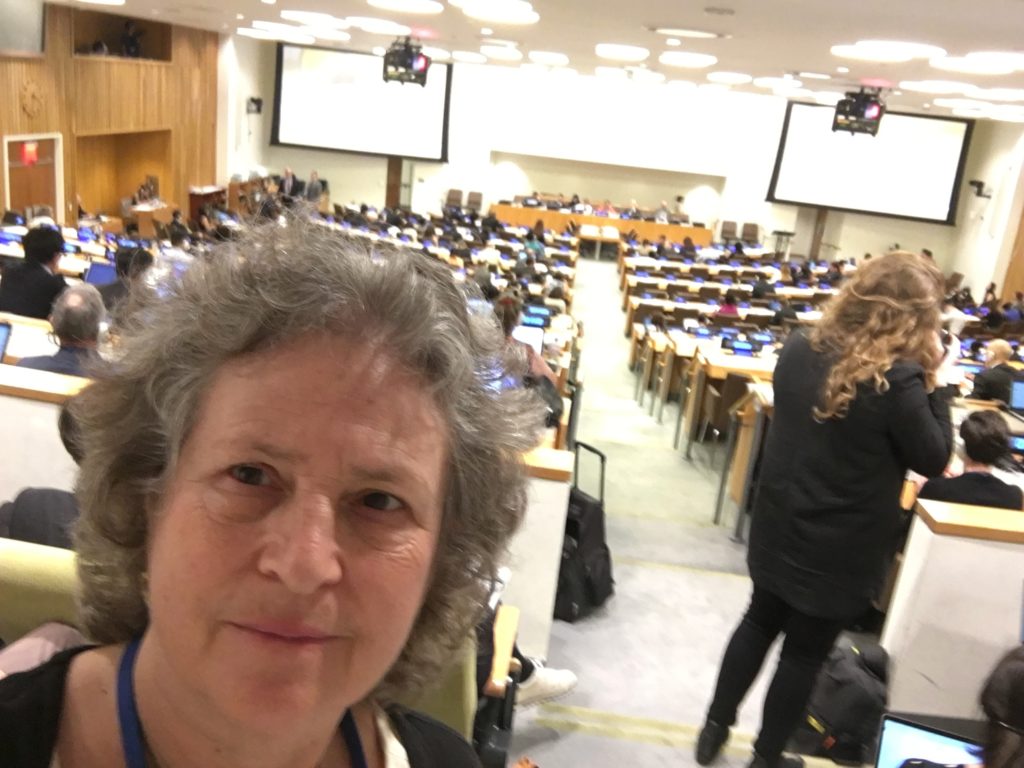NPT’s Second Failure to Reach Consensus
TRANSCEND MEMBERS, 5 Sep 2022
Diane Perlman, Ph.D. - TRANSCEND Media Service
3 Sep 2022 – The 4-week UN Nuclear Nonproliferation Treaty Review Conference (NPT RevCon), rescheduled from May 2020 due to Covid, ended around 11:30 PM on August 26, 2022 in its second failure to reach consensus. This highlights the need for input from our field of conflict transformation.
The final plenary session, scheduled for 10 AM Friday August 26, was postponed until 3 PM, then 4:30, then 5:30, then 6:00, but began around 8 PM after last ditch efforts to reach a consensus failed. In final speeches going until 11:30 PM, delegates expressed gratitude to the chair, and deep regrets for the failure which most blamed on Russia, directly or indirectly.
This was the second consecutive failure. The previous 2015 NPT RevCon failed to reach consensus over opposition by the US and other parties to convene a conference on a nuclear and WMD free zone in the Middle East, which was a condition of the 1995 NPT RevCon for an indefinite extension of the 5-year NPT Review cycles.
Members of nongovernmental organizations (NGOs) attend UN meetings to represent the interests of civil society. We hold side events, teach each other and official delegates. I was proud to represent TRANSCEND International and Mediators Beyond Borders.
I will write my analysis when I am able. For now, I will present some important pieces, written mostly by old and new friends, to give you in-depth analyses about this earth-shattering, enduring conflict, at a stalemate for 52 years.

NGO Side event, August 12 on “Nuclear dangers and the disarmament and arms control architecture”. Organized by Brazil and Pugwash, with Dr. Steven E. Miller, Belfer Center and Harvard University and chair of the Pugwash Executive Committee, Mr. Andrey Belousov, Deputy Permanent Representative of Russian Federation to the UN Office Geneva, TRANSCEND Member/Pugwash President Sérgio Duarte, Wael Al Assad, Senior Adviser to the Qatari National Committee for the Prohibition of Weapons and Pugwash Council Member and Professor Paolo Cotta Ramusino, Pugwash Secretary-General.
The NPT was based on a bargain that the nonnuclear weapons states (NNWS) would agree not to acquire nukes. In exchange, according to Article 6 of the NPT the nuclear weapons states (NWS), agreed to negotiate in good faith towards total disarmament.
The basic dynamics involves tensions between the NNWS urgent call for nuclear disarmament, as promised in the NPT, and the NWS, the US, UK, France, Russia and China, along with allies under their “nuclear umbrella” and countries hosting US nuclear weapons on their soil, including the Netherlands, Belgium, Germany and Turkey.
The NWS show no signs of giving up their nukes, which they claim they need for deterrence, now due to the current “security environment.” Basically, all the NGOs representing civil society and most NNWS have been clamoring for nuclear disarmament while the NWS present rationales for why they cannot give up their nukes yet.
The NNWS have called for measures towards the elimination of nuclear weapons, the establishment of nuclear weapons free zones around the world, reducing the role of nuclear weapons in security policies, taking nukes off of hair-trigger alert status, a no first use policy, a comprehensive test ban treaty, CTBT, fissile material cutoff treaty, and the Treaty on the Prohibition of Nuclear Weapons (TPNW), disparaged by the NWS, and so on. Trump pulled out of the Intermediate-Range Nuclear Forces INF treaty, What remains of the security architecture between the US and Russia is New START Treaty before its expiration in 2026.
There have been several initiatives outside of the NPT process to try to achieve what the NPT has failed to accomplish. They were all boycotted by the NWSs. These include:
- The Humanitarian Consequences Initiative – 3 conferences emphasizing the severe impacts of nuclear weapons from production on
- The Treaty on the Prohibition of Nuclear Weapons (TPNW) or the “ban treaty” for which the 2017 Nobel Peace Prize was awarded to the International Campaign to Abolish Nuclear Weapons
- Conferences on establishing a Nuclear and WMZD Free Zone in the Middle East.
From a conflict analysis perspective, the above measures address the weapons themselves, the symptoms, known as First Order Change in systems theory. None address the underlying conflicts, systems and relationships, known as Second Order Change. This is where we can make a difference.
There will be a third conference on a Nuclear and WMZD Free Zone in the Middle East at the UN in NY from November 14 – 18. This will be an opportunity for us to raise consciousness about the essential role of conflict transformation, including the TRANSCEND Method.
Civil Society Representation
Participation from NGOs has increased over the years. Here is a calendar of side events organized by NGOs, often including delegates as presenters or attending.
It has become a tradition for selected NGOs to present to the delegates on a 3- hour panel during the first week. Some of the NGO presentations are embedded in the information below. Many of the delegates especially from nonnuclear states, called for increased participation for members of civil society.
Below is a sampling of pieces to give you an idea of the problems and the process, many from NGOs representing civil society.
- Comment from Jonathan Granoff, friend and President of the Global Security Institute and representative to United Nations of the World Summits of Nobel Peace Laureates.
Friends, I think you might find this presentation relevant. The issue I am trying to highlight is that there have been several successful NPT review conferences where diplomats have done a praiseworthy job in pledging on behalf of their governments to achieve a safer world and advancing nuclear disarmament only to be foiled in their capitals when the military policy planners, influencers, lobbyists, and officers ignore these pledges and succeed in instituting policies in the exact opposite direction. The problem is not one of a legal instrument. The problem is one of the political will to stand up the distorted pursuit of security by threatening global annihilation. Here was my best effort:
https://gsinstitute.org/un-speech-more-capacity-to-destroy-will-not-bring-more-peace
- Joint Humanitarian Statement by the Costa Rican Ambassador on behalf of 145 Member States
MISIÓN PERMANENTE DE COSTA RICA ANTE LAS NACIONES UNIDAS 211 E. 43rd Street, Room 1002, New York, NY 10017. Tel: (212) 986-6373
Joint Humanitarian Statement
Delivered by H.E Maritza Chan, Ambassador, Chargé daffaires, Permanent Mission of Costa Rica to the United Nations. X Review Conference of the Parties to the Treaty on the Non-Proliferation of Nuclear Weapons New York, August 22, 2022
I am taking the floor on behalf of 145 Member States: Algeria, Andorra, Angola, Antigua and Barbuda, Argentina, Armenia, Austria, Azerbaijan, Bahamas, Bahrain, Bangladesh, Barbados, Belize, Benin, Bhutan, Bolivia, Botswana, Brazil, Brunei Darussalam, Burkina Faso, Burundi, Cabo Verde, Cambodia, Cameroon, Central African Republic, Chad, Chile, Colombia, Comoros, Congo, Cook Islands, Côte d’Ivoire, Cuba, Cyprus, Democratic Republic of the Congo, Djibouti, Dominica, Dominican Republic, Ecuador, Egypt, El Salvador, Equatorial Guinea, Eritrea, Eswatini, Ethiopia, Fiji, Gabon, Gambia, Ghana, Grenada, Guatemala, Guinea, Guinea Bissau, Guyana, Haiti, Honduras, Indonesia, Iran, Iraq, Ireland, Jamaica, Japan, Jordan, Kazakhstan, Kenya, Kiribati, Kuwait, Kyrgyzstan, Lao PDR, Lebanon, Lesotho, Liberia, Libya, Liechtenstein, Madagascar, Malawi, Malaysia, Maldives, Mali, Malta, Marshall Islands, Mauritania, Mauritius, Mexico, Federated States of Micronesia, Republic of Moldova, Mongolia, Morocco, Mozambique, Myanmar, Namibia, Nauru, Nepal, New Zealand, Nicaragua, Niger, Nigeria, Niue, Oman, Palau, State of Palestine, Panama, Papua New Guinea, Paraguay, Peru, Philippines, Qatar, Rwanda, Saint Kitts and Nevis, Saint Lucia, Saint Vincent and the Grenadines, Samoa, San Marino, Sao Tome and Principe, Saudi Arabia, Senegal, Seychelles, Sierra Leone, Singapore, Solomon Islands, South Africa, South Sudan, Sri Lanka, Sudan, Suriname, Switzerland, Tajikistan, Tanzania, Thailand, Timor-Leste, Togo, Tonga, Trinidad and Tobago, Tunisia, Tuvalu, Uganda, United Arab Emirates, Uruguay, Vanuatu, Venezuela, Viet Nam, Yemen, Zambia, Zimbabwe and my own country, Costa Rica.
- Our countries are deeply concerned about the catastrophic humanitarian consequences of nuclear weapons. Past experience of the use and testing of nuclear weapons has demonstrated the unacceptable humanitarian and environmental consequences caused by their immense, destructive capability and indiscriminate nature.
- Fact-based discussions on the humanitarian impacts of nuclear weapons took place at international Conferences convened respectively by Norway in March 2013, Mexico in February 2014, and by Austria in December 2014 and June 2022. These conferences have deepened our collective understanding of the humanitarian impact of nuclear weapons, and a key message from experts and international organisations was that no State, group of States, or indeed the international humanitarian system as a whole, could respond to the immediate humanitarian emergency a nuclear weapon detonation would cause. Nor could they provide adequate assistance to victims.
- The broad participation at the Humanitarian Impacts Conferences by a majority of States, the ICRC, UN humanitarian organisations and civil society, reflected the recognition that the catastrophic humanitarian consequences of nuclear weapons are a fundamental and global concern. We firmly believe that it is in the interests of all States to engage in discussions on the humanitarian consequences of nuclear weapons to further broaden and deepen understanding. We welcome civil society’s ongoing engagement on this matter.
- This work is essential, because the catastrophic consequences of nuclear weapons affect not only governments, but each and every citizen in our interconnected world. These consequences have deep implications for human survival; for our environment; for socioeconomic development; for our economies; and for the health of future generations. We note, for example, the strongly disproportionate and gendered impacts of exposure to ionizing radiation for women and girls. For these reasons, we firmly believe that awareness of the catastrophic consequences of nuclear weapons must underpin all approaches and efforts towards nuclear disarmament, including in the work of the Tenth Review Conference of the Nuclear Non-Proliferation Treaty (NPT).
- This is not, of course, a new idea. The appalling humanitarian consequences of nuclear weapons were evident from the moment of their very first use and, from that moment, motivated humanity’s aspirations for a world free from this threat. The humanitarian consequences of nuclear weapons are reflected in numerous UN resolutions, including the first resolution passed by the General Assembly in 1946, and in multilateral instruments including the NPT. The world’s most eminent nuclear physicists observed as early as 1955 that nuclear weapons threaten the continued existence of mankind and that a war with these weapons could quite possibly put an end to the human race. The First Special Session of the General Assembly devoted to Disarmament (SSOD-1) stressed in 1978 that “nuclear weapons pose the greatest danger to mankind and to the survival of civilisation.” These expressions of profound concern remain as compelling as ever.
- We are therefore encouraged that the renewed humanitarian focus established by the 2010 NPT Review Conference, when States Parties expressed “deep concern at the catastrophic humanitarian consequences of any use of nuclear weapons”, is being sustained. Today’s statement is further support for that focus.
- It is in the interest of the very survival of humanity that nuclear weapons are never used again, under any circumstances. The catastrophic effects of a nuclear weapon detonation, whether by accident, miscalculation or design, cannot be adequately addressed. All efforts must be exerted to eliminate the threat of these weapons of mass destruction.
- The only way to guarantee that nuclear weapons will never be used again is through their total elimination. All States share the responsibility to prevent the use of nuclear weapons, to prevent their vertical and horizontal proliferation and to achieve nuclear disarmament, including through fulfilling the objectives of the NPT and achieving its universality.
- We welcome the resolve of the international community, together with the ICRC and international humanitarian organisations, to address the catastrophic humanitarian consequences of nuclear weapons. By raising awareness about this issue, civil society has a crucial role to play side-by-side with governments as we fulfil our responsibilities. We owe it to future generations to work together to do just that, and in doing so to rid our world of the threat posed by nuclear weapons.
The following pieces analyze the failure to reach consensus and its meaning.
- Excerpts from Comments from Daryl Kimball, President, Arms Control Association (ACA)
A brief update and some thoughts on the end-game at the 10th NPT RevCon ….
Many nonnuclear weapon states are justifiably displeased with the lack of ambition and specificity on nuclear disarmament matters.
ACA Statement:
“It would be a mistake to call this conference as anything but a disappointing failure, particularly by the nuclear-armed states and their allies, to update the NPT by agreeing to specific action steps that are essential to effectively address the growing dangers of nuclear arms racing and nuclear weapons use.”
By our count, there is only a single item on the list of disarmament and risk reduction initiatives or actions in the document that sets forth a specific, unconditional action step within a set timeframe. In paragraph 188.17, the document says:
“The Russian Federation and the United States commit to the full implementation of the New START Treaty and to pursue negotiations in good faith on a successor framework to New START before its expiration in 2026, in order to achieve deeper, irreversible, and verifiable reductions in their nuclear arsenals.”
- Analysis by Alyn Ware, President of Parliamentarians for Nuclear Nonproliferation and Disarmament (PNND) and UNFOLD Zero
NPT Review Conference ends without agreement: What next?
Can new actions/initiatives come from the NPT deliberations?
- News In Review Analyses by Rae Acheson, WILPF, Women’s International League for Peace and Freedom’s Reaching Critical Will (see all 10 on the link)
NPT News in Review, Vol. 17, No. 8
Editorial: The Myth of the Middle. 20 August 2022. Ray Acheson
NPT News in Review, Vol. 17, No. 9
Editorial: “Emotional Distractions” from “Serious States” 22 August 2022. Ray Acheson
NPT News in Review, Vol. 17, No. 10
Editorial: The Monstrous Game of Nuclear Annihilation 27 August 2022. Ray Acheson
- Excerpts from email Message from Ivana Hughes, new President, Nuclear Age Peace Foundation:
| Dear NAPF Community,
It is with a great sense of excitement that I greet you following my first month as NAPF’s President. Coincidentally, August 1 turned out to be three things: 1. My first official day in this position; 2. The first day of the 10th Nuclear Non-Proliferation Treaty (NPT) Conference at the United Nations (UN) in New York City; and 3. My daughter’s (oldest of three children) 21st birthday. And thus the day marked a new phase in my own personal and professional life, but also in the nuclear disarmament sphere more generally. Meeting both NGO colleagues and diplomats that first week, I kept saying in jest that my hope was that the failure or success of the conference would not be a reflection on my own path at NAPF. Attending the conference was truly an emotional rollercoaster. That first day, I was elated hearing from the UN Secretary General Antonio Guterres, whose brilliant statement will surely provide no shortage of quotes on the urgency, necessity, and imperative of nuclear disarmament. From saying that humanity is “one miscalculation away from nuclear annihilation,” to warning that, “luck is not a strategy,” Secretary General expressed deep commitment to nuclear abolition and the Treaty on the Prohibition of Nuclear Weapons (TPNW). In fact, Secretary General left the conference after his remarks to board a plane to Japan, where he was to visit Hiroshima on August 6, the 77thanniversary of the atomic bombing. His dedication to the cause was apparent from both his words and his actions. But the first day wasn’t all wonderful. I got to watch the United States (US) Secretary of State Anthony Blinken state that “The United States would only (emphasis mine) use nuclear weapons under extreme circumstances,” a position I find morally and ethically repugnant. In my opinion, no circumstances would justify incinerating and sickening civilians by the thousands or millions, while putting all of humanity at risk of starvation following use of even a fraction of today’s nuclear arsenals. The remainder of the week featured statements by individual states or groups of states, and I would single out the statements made by Austria, the Holy See, and South Africa, as models for how countries should be thinking about the NPT and its disarmament provisions. Also notable were the statements by the Marshall Islands and Kiribati, two countries that experienced the devastating short- and long-term consequences of nuclear weapons testing, conducted by the US and the United Kingdom (UK). Sadly, the Nuclear Weapon States (NWS: China, France, Russia, UK, and US) and many of their allies, especially the France/UK/US NATO allies, expressed far too little interest in nuclear disarmament and far more interest in maintaining the status quo. It’s as if they had not listened to the Secretary General’s remarks at all, as if the TPNW did not exist, as if there weren’t a war and other geopolitical tensions involving multiple NWS. They seemed to advocate for business as usual, with disarmament only a dream for the naïve. The end of the week featured the NGO session, where I was proud to deliver a statement on behalf of NAPF. If you have not watched the statement, I hope you’ll take time to do so. It is only six minutes long and you can find it here |
| It was exhilarating to not only have the opportunity to share with the conference my own and NAPF’s views on the urgency of nuclear disarmament, but also to hear from giants in the field, such as Sergio Duarte (former UN High Representative for Disarmament and President of the Pugwash Conferences) and Jackie Cabasso (from Western States Legal Foundation and Mayors for Peace), as well as rising stars of nuclear disarmament such as Yuta Takahashi of NO NUKES Tokyo and Benetick Kabua Maddison of the Marshallese Educational Initiative, who is also a part of our youth initiative, Reverse the Trend.
During the third week of August, and back in New York and at the UN, I had the opportunity to participate in three separate conference side events. The first, co-organized by NAPF and IPPNW, took place on August 15. I was fortunate to Chair a fantastic panel of four fabulous experts and fierce advocates of a nuclear weapons-free world: Veronique Christory (ICRC Senior Advisor), Ambassador Tito of Kiribati, Tilman Ruff (Co-President of IPPNW), and Bonnie Docherty (Harvard Law Human Rights Clinic and Human Rights Watch). The focus of the panel was on humanitarian consequences of nuclear weapons and the discussion ranged from past to present to future, with important remarks and connections to the TPNW. I also participated at an August 17 side event, co-organized by Austria and Princeton, where I spoke about the environmental consequences of nuclear weapons testing in the Marshall Islands. And finally, on August 19, at another side-event co-organized by Abolition 2000 and World Future Council and others, I made the case for an absolutist position on nuclear abolition. All three events were amazing opportunities to advance NAPF’s mission and vision. · Article by Ivana Nikolic Hughes, for NAPF NO CONSENSUS AT THE 10TH NPT REVIEW CONFERENCE · Article by Jackie Cabasso, Western States Legal Fund and Mayors for Peace A Four-Week Festival of Double Standards Hypocrisy & Outright Lying by Nuclear-armed States |
| · Analysis by Matt Robson, NZ Minister of Disarmament and Arms Control and Associate Foreign Minister 1999-2002
NZ is back under the Nuclear Umbrella – Sleepwalking to War As Minister of Disarmament in the Labour-Alliance Coalition, I had the authority of government to state that New Zealand would not be part of any nuclear armed military bloc. Furthermore, I was authorised to state that we would pursue an independent foreign policy and we would not march off to almost every war launched by Great Britain and then the United States – our “traditional” allies. As Minister responsible for overseas development aid, I refused to join in the clamour denouncing China’s aid programmes in the Pacific. As I repeated to the frequent breathless media enquiries about Chinese expansionism, China had very right to forge ties with the sovereign countries of the Pacific, and if influence was their aim, the earlier European colonisers, New Zealand included, had made it a difficult marketplace for them. I did not consider, as the current Prime Minister does, that the Pacific was our “backyard”. I give these two examples because, without public discussion, the Labour government, like National before it, has drawn us into the largest nuclear armed military alliance in the world, NATO, and has signed up to the encirclement strategy of Russia and China. I doubt if most of the Cabinet members have read, or are even aware of, the partnership agreements signed with NATO. In the 2010 Individual Partnership and Cooperation Programme, they will find that New Zealand is committed to “enhancing inter-operability and enabling support/logistics cooperation, which would further assist the New Zealand Defence Force engagement in any future NATO-led missions”. Hopefully, they will be astonished at this seemingly open-ended commitment to engage in NATO-led wars. In the agreements, much is made of working with NATO, militarily, across the globe in many military missions. This is the same NATO that began life in 1949, supporting the suppression of the colonial liberation movements, dismembering Yugoslavia and conducting an illegal bombing campaign of 78 days, and with many of its members joining the illegal invasion of Iraq . In its 2021 Communique, which I see no evidence of Cabinet members having read, NATO boasts that its nuclear arsenal is ever expanding, that it is committed to containing Russian and China, and praises New Zealand for joining in the strategy of encircling China. In the same document, the Treaty for the Prohibition of Nuclear Weapons, a key commitment for New Zealand, is denounced. The 2021 NZ Defence Assessment is straight out of the NATO Communique. Despite evoking Maori whakatauki for peace, it urges the Government to become an active participant in the US-led containment strategies of Russia and China and to upgrade the military capability significantly. The term Indo-Pacific has replaced Asia-Pacific. New Zealand is effortlessly placed into the US strategy of encircling China, from India to Japan, with New Zealand a junior partner. War beckons. And that brings us up to the war in Ukraine. I would urge Cabinet members to read the 2019 Rand Study called “Overextending and Unbalancing Russia”. This will help to give context to the present war. Cabinet, before building on the military already deployed to NATO and conceding Defence Minister Henare’s plea to send missiles, should realise that this war began a long time before Russian forces pushed past the Donbas into Ukraine. Cabinet needs to consider the promises in 1991 that NATO would not expand to the East and certainly not to threaten Russia. Thirteen member states are now 30 with 3 more set to join. The Minsk 1 and 2 Agreements of 2014 and 2015, forged by Russia, Ukraine, Germany and France, which recognised the Donbas regions of Ukraine as autonomous regions are fundamental to understanding the current war. They were violated before the ink was dry with continuous heavy fighting between Ukrainian armed forces, nationalist and neo fascist militias and the armed forces of the Russian- speaking autonomous republics. Over 14,000 lives have been lost in this inter-Ukrainian war. The Minsk Agreements, the internal Ukrainian divisions, the overthrow of the democratically elected government of President Yanukovych in 2014, and the role of the US and well- funded neo-Nazi groups in that event, the refusal of the US to restore the intermediate-range nuclear weapons treaty with Russia, the stationing of those weapons in Romania, Slovenia and now Poland (like Cuba so close to a major superpower) should be discussed by Cabinet so that we develop our policy on the Ukraine by understanding the complexities. Cabinet needs to step back in what seems to be a rush to war under the nuclear umbrella. It needs to study the plethora of US and NATO strategy documents, on the public record and not part of some clever Russian disinformation campaign as some would have it, that have planned for Russia being embroiled in a war with a well-armed and well-trained Ukrainian military with its shock troops of neo-Nazis. And then, Cabinet needs to realise that the even bigger target for NATO is China. New Zealand has been drawn into that game plan as part of the ring of countries, either nuclear armed or under the protection of nuclear armed countries, that the United States is thrusting in the face of China. If we are to adhere to the principles enshrined in the hard won 1987 Nuclear Free Zone Arms Control and Disarmament Act, we should withdraw from the partnership with nuclear armed NATO and its aggressive war plans and join, with clean hands, and return to the independent foreign policy that I was proud as a Minister to promote. ___________________________________________________________________ I hope these pieces give you a deep understanding of the dysfunctional dynamics, structures, systems and processes that impede enlightened solutions to this so far global, existential, intractable conflict. As you can see, there is a place for our field of conflict analysis and transformation, which has been largely absent from the deliberations. Let’s consider ways we might intervene with solutions-oriented strategies. |
Friday night, around 9 PM, delegates making final statements after the 2022 NPT RevCon concludes without a consensus.
_____________________________________________
 Diane Perlman, PhD is a clinical and political psychologist, devoted to applying knowledge from psychology, conflict studies and social sciences to designing strategies and policies to reverse nuclear proliferation, to drastically reduce terrorism, reduce enmity, and to raise consciousness about nonviolent strategies for tension reduction and conflict transformation. She is a visiting scholar at the School for Conflict Analysis and Resolution at George Mason University, is active in Psychologists for Social Responsibility, the TRANSCEND Network for Peace Development Environment, and on the Global Council of Abolition 2000. Some of her writings can be found on her websites, www.consciouspolitics.org and www.SanityandSurvival.com. Email: dianeperlman@gmail.com
Diane Perlman, PhD is a clinical and political psychologist, devoted to applying knowledge from psychology, conflict studies and social sciences to designing strategies and policies to reverse nuclear proliferation, to drastically reduce terrorism, reduce enmity, and to raise consciousness about nonviolent strategies for tension reduction and conflict transformation. She is a visiting scholar at the School for Conflict Analysis and Resolution at George Mason University, is active in Psychologists for Social Responsibility, the TRANSCEND Network for Peace Development Environment, and on the Global Council of Abolition 2000. Some of her writings can be found on her websites, www.consciouspolitics.org and www.SanityandSurvival.com. Email: dianeperlman@gmail.com
Tags: NPT, Nonproliferation, Nuclear Weapons, Nuclear club, Nuclear war, United Nations
This article originally appeared on Transcend Media Service (TMS) on 5 Sep 2022.
Anticopyright: Editorials and articles originated on TMS may be freely reprinted, disseminated, translated and used as background material, provided an acknowledgement and link to the source, TMS: NPT’s Second Failure to Reach Consensus, is included. Thank you.
If you enjoyed this article, please donate to TMS to join the growing list of TMS Supporters.

This work is licensed under a CC BY-NC 4.0 License.



Diane, thank you for this initial report back from the NPT conference. You wrote that most delegates blamed the failure to reach a consensus on Russia, “directly or indirectly.” Were these accusations fair and based on objective facts? What role did any of the other nuclear weapons states play?
Thank you for being there and representing TRANSCEND!